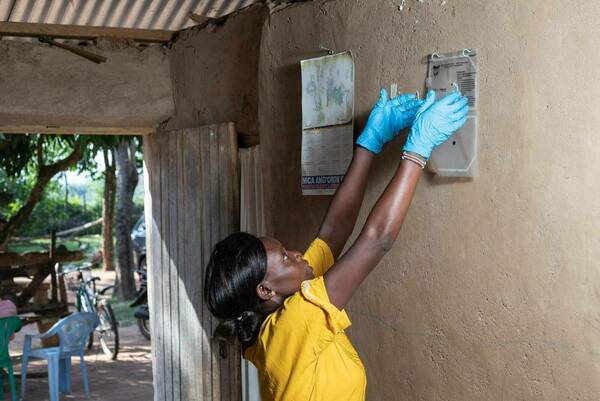NMRC Commander visits Notre Dame to discuss future research collaboration opportunities
The University of Notre Dame’s Eck Institute for Global Health invited Capt. Franca Jones, commander, Naval Medical Research Command (NMRC), and Dr. Jill Phan, NMRC’s science director, to campus to explore collaborative research opportunities between the university and NMRC.
During their visit, Capt. Jones and Dr. Phan met with over 20 Notre Dame scientists with expertise in infectious disease surveillance, antimicrobial resistance, drug and vaccine development, biomedical applications, and more.
The Eck Institute’s assistant director of research and partnerships, Nydia Morales-Soto, coordinated NMRC’s visit with selected Notre Dame scientists whose ongoing research overlapped with NMRC’s core research priority areas.

“NMRC and Notre Dame conduct research in many overlapping areas, such as antimicrobial resistance and vaccine development,” Morales-Soto said. “I’m confident this visit marks an exciting new phase in our partnership with NMRC and the Department of Defense, building on our existing collaboration through Notre Dame's Remote Emerging Disease Intelligence NETwork and broadening the scope of our collaboration efforts.”
Morales-Soto also highlighted her appreciation for Capt. Jones as they explored student research opportunities for Eck’s undergraduate minor and Master of Science in Global Health students.
While on campus, Capt. Jones delivered several lectures to undergraduate and graduate students and faculty from the university’s College of Science on the vital role that military medical research plays in effectively identifying and curbing the negative effects of infectious disease outbreaks, which is essential for maintaining the U.S. military’s readiness around the globe.
Capt. Jones said, “Our visit to Notre Dame served to spark collaboration in areas of mutual interest related to the health of active-duty service members and veterans. In addition, the opportunity to teach two lectures enabled us to educate Notre Dame faculty, staff and students about the work done in Navy Medicine as well as promote the Navy as a career choice for scientists and global health experts.”
Capt. Jones also provided an overview of the other seven commands within Navy Medicine Research & Development (NMR&D), which she overseas as commander of NMRC. The eight NMR&D commands operate headquarters and laboratories across Asia, South America, Europe, Africa, and the United States.
“The Eck Institute was honored to organize and host NMRC leadership’s first visit to Notre Dame,” said Tim Weber, associate director of the Eck Institute. “The University of Notre Dame and the Department of the Navy have a proud tradition of working together in many research areas. NMRC’s visit was an excellent opportunity to bring two world-class research organizations together to tackle important global health problems while improving the health and readiness of our country’s Sailors and Marines.”
Contact:
Brett Beasley / Research Content Strategy Program Director
Notre Dame Research / University of Notre Dame
bbeasle1@nd.edu / +1 574-631-8183
research.nd.edu / @UNDResearch
About Notre Dame Research:
The University of Notre Dame is a private research and teaching university inspired by its Catholic mission. Located in South Bend, Indiana, its researchers are advancing human understanding through research, scholarship, education, and creative endeavor in order to be a repository for knowledge and a powerful means for doing good in the world. For more information, please see research.nd.edu or @UNDResearch.
Originally published by at globalhealth.nd.edu on October 24, 2024.
Latest Research
- NSF Cyber SMART’s fall meeting shapes fifth year of project, legacy and future plans, and adds new memberThe U.S. National Science Foundation (NSF) Cyber SMART center gathered for its fall meeting on the University of Notre Dame campus this September. The meeting served as a checkpoint with progress reports and new projects from research leads and students…
- Slavic and Eurasian studies professor wins Humboldt fellowship to research how Russia’s religious past shapes its presentWhen Russia invaded Ukraine on Feb. 24, 2022, Sean Griffin realized his second book needed a new title. Griffin, an associate professor in the University of Notre Dame’s Department of…
- Notre Dame’s R.I.S.E. AI Conference builds interdisciplinary collaboration to inform human-centered artificial intelligenceAs artificial intelligence (AI) transforms nearly every sector of society — from healthcare and education to governance and global development — a critical question emerges: How can we conscientiously design and deploy these powerful technologies to positively impact society? This…
- University of Notre Dame joins the Global Coalition of Ukrainian StudiesThe University of Notre Dame has joined the Global Coalition of Ukrainian Studies after signing a Memorandum of Cooperation (MOC), formalized on September 24, 2025, at the Ukrainian Institute of America in New York City. Notre Dame joined four other American…
- The University of Notre Dame’s Mendoza College of Business and Industry Labs team up to inspire national security manufacturing competitiveness in the regionThe South Bend - Elkhart Region is full of manufacturing companies that are poised to grow, and Executive Master of Business Administration (EMBA) and Master of Business Administration (MBA) students at the University of Notre Dame are finding innovative ways to contribute to that growth. Earlier…
- Notre Dame research informs WHO conditional recommendation for spatial repellents in malaria vector controlThe World Health Organization (WHO) recently announced a “conditional recommendation” for spatial emanators, also known as “spatial repellents,” in the fight against malaria. This key determination was informed by spatial repellent studies that included the Advancing Evidence for the Global Implementation of Spatial Repellents (AEGIS) Project in Kenya, led by the University of Notre Dame and funded by Unitaid. The findings from this particular study were recently published in The Lancet.













